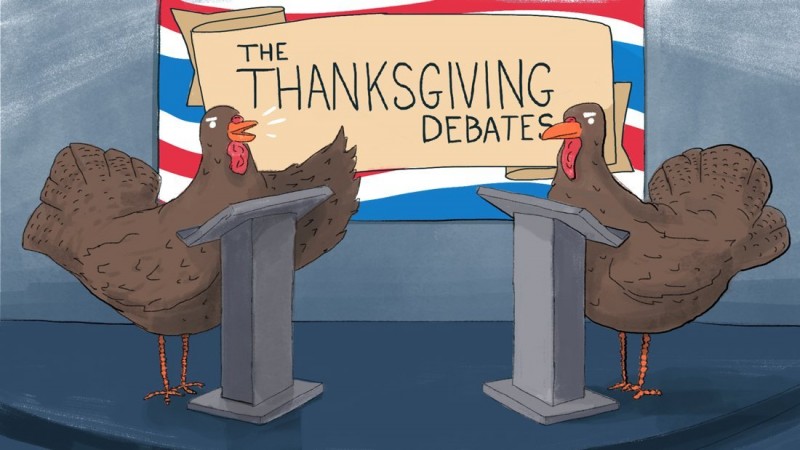Most years, the Thanksgiving bloodsport of choice is football.
Political debate typically comes in a close second, so long as the sweet gift wine is flowing and there is something sufficiently inflammatory in the news.
But this campaign season, the wildest in recent memory, the order is reversed. The turkeys at your table will be cluck-clucking about everything from Donald Trump (lots of Trump) and Ben Carson to Hillary Clinton and her “damn emails.”
Your mission: pick their bones clean, and do it with a smile.
So with the help of two expert debate coaches, both schooled in the art and science of rhetorical argument, we’ve added a new chapter to the holiday cookbook.
Today’s recipe: How to serve up a fresh slice of humble pie, in seven easy steps.
1. If you’re not cheating, you’re not trying
Dana Randall, executive board chair for the National Debate Coaches Association, says: “There are no refs at the dinner table. Odds are in these debates someone will play dirty — ad hominem attacks, non sequiturs, and hasty generalizations will be par for the course — if you aren’t willing to stoop that low, keep in mind they may be coming your way and you will need a better response than, ‘that’s a logical fallacy,’ to shut it down.
“If things do in fact sink to this level, don’t forget to utilize the ‘guilt by association’ tactic. Lump your opponent in with some deplorable group or force them to defend all the baggage that comes with that label.”
2. What to do when someone plays the “Trump (or Clinton or Carson or Sanders) has a point, you have to admit” card
Randall: “(When this happens) you could say ‘I’ll Admit X when you admit Y’ — and insert some point they would find equally indefensible. You can also say, ‘even if X is true, it’s irrelevant because of,’ or, ‘insignificant in light of’ and bring the discussion back to your point.
“For instance, they say: ‘You have to admit that Trump seems rational when he discusses closing the carried interest tax loophole.’
“You respond: ‘Sure. But that doesn’t make his stance on immigration any less asinine.'”
3. Play to your audience — win them and win the debate
Scott Wunn, executive director of the National Speech & Debate Association, says: “What’s really awesome about the Thanksgiving table is that it may be more important to convince your aunt than the uncle you’re arguing with. Because your aunt may have more influence on your uncle’s attitude about the topic later, after dinner, than if you actually convince your uncle.”
4. Lost a point? Easy — change the subject!
Randall: “Acknowledge that your opponent may have a point. You can see how they came to their conclusion but [make the point that] they have ignored or overlooked other relevant points or facts that mean they have ultimately come to a faulty conclusion.”
5. When you’re winning, go for the kill
Randall: “You should emphasize when and where you are winning, but not in isolation — if you repeat your most convincing point it does not become more convincing. Instead, you should explain why the issue you are correct about should be the deciding issue for the debate.
“For example: If you win on the point that Sanders is the best candidate for the environment and your opponent’s argument is that Clinton is the best candidate for the economy, explain why resolving environmental issues is a bigger deal than enhanced economic growth.”
6. Be funny — that’s what they’ll remember
Wunn: “For the last three weeks, if you asked anybody who happened to be turning on any of the primary debates, if you asked them to say three lines that they remember, I can almost promise you that one of them will be, ‘Enough with the damn emails!’ … Everybody remembers that because millions of people laughed. Whether or not they were on one side or another of the aisle, it didn’t matter. Whether or not they agreed with the suggestion the emails should be ignored, didn’t matter.
“Get people laughing not at the person, but the absurdity of the argument.”
7. Know when to quit
Wunn: “We’ve all been there, we’ve all known that we made a great point, but then for some reason we have this belief that people didn’t get it or hear it, and the reality is they absolutely did — the quieter they are, the more you probably caused them to think. So at a Thanksgiving dinner table, my advice would be: If you win the argument against your uncle, stop talking and say, ‘Can someone pass the potatoes?'”
